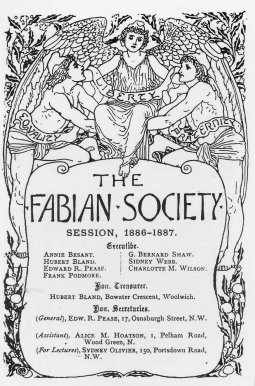On this date in 1884 the Fabian Society was founded.
Frye on the influence of the Fabian Society on G. B. Shaw in “The Writer as Prophet”:
At first, of course, Shaw was handicapped by his lack of knowledge of life: when he started in, he really didn’t know anything except the fact that he wanted to write. He educated himself, partly by reading in the British Museum, partly by going out in the evenings to all sorts of debating societies and discussion groups. In the course of this he decided that the only way to get any concrete knowledge of the world he lived in was to study economics. He read Karl Marx and became a socialist, though never a Marxist. In May 1884, he dropped in on a tiny discussion group, five months old, called the Fabian Society, which proposed to bring socialism to England by constitutional means. The minutes for that evening record that the meeting was made memorable by the first appearance of Mr. Bernard Shaw. The note is in Shaw’s handwriting. Shaw liked the Fabian Society, because its members didn’t take themselves quite as seriously as some of the others, and he persuaded a young friend of his named Sidney Webb to join it. Sidney Webb brought in others, including the brilliant woman who became Beatrice Webb, and the Fabian Society started one of the greatest political movements of modern times, a movement which has already changed the history of the world and is by no means finished yet. It was through the working of the Fabian Society that Shaw learned enough about modern life to become a great dramatist. For years he slugged away writing pamphlets and making speeches, serving on vestry boards and municipal councils; and when he began to write plays about the conditions of life in Victorian society, he knew what he was talking about. (CW 10, 177)

